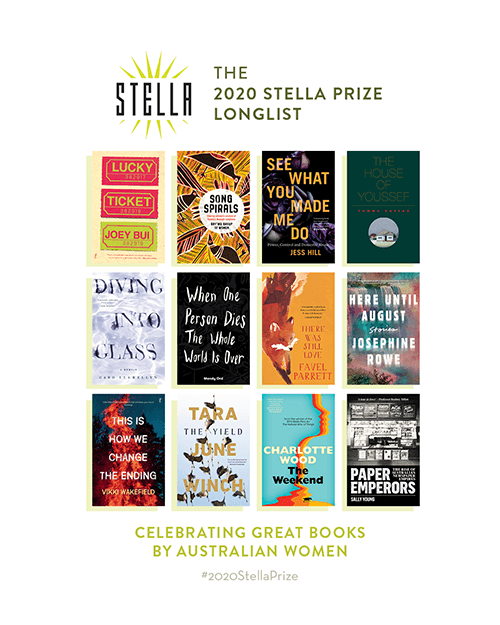Gender inequality and unconscious bias trickle into every area of our lives – including influencing the shows we watch, the podcasts we listen to and importantly, the books we read. The sneaky nature of unconscious bias means we may not even be aware that our attitudes and life experiences are shaping our reading habits.
We’re setting you a #FeministBookWeekChallenge!
- Write down all the books you’ve read in 2020 (this list may be extra long for those of us in iso).
- Now consider how many of these books are written by women/how many by women of colour/how many authors identify as indigenous/how many books centre queer stories/how many share a migrant experience?
Being an intersectional feminist means learning from a variety of sources and people and creating space in your brain for diverse and nuanced stories. Feminist Book Week is an opportunity to critically look at your reading habits and be challenged to read more young, female and diverse authors.
If the only voices missing from your list are pale, male and stale, then you’re on the right track! If there’s not enough diversity in your reading list, we’ve got the answer for you. Along with our friends at the Feminist Writers Festival, we’ve compiled this recommendations list to get you started and linked to even more feminist reading ideas.

One in five people in Australia have a disability, yet disabled people and stories are still hugely underrepresented in literature.
Growing up Disabled in Australia, edited by Carly Findlay brings together 40 original pieces by writers living with a disability in Australia. Carly has also published Say Hello, a memoir sharing her experiences living with a highly visible skin condition and as a public advocate for appearance diversity issues. (Carly was also a presenter in our International Day of the Girl webinar series – so sign up as a member to be notified when the webinar recordings are made available!)
Through 28 essays and poems, Shaping the Fractured Self gives voice to people who live with chronic illness and pain, as well as their careers, medical practitioners and researchers. For more fiction, non-fiction and kids’ books, check out this list.
We are all living on stolen land – so let’s focus on the voices and experiences of First Nations women.
2020 has seen the release and celebration of many books by First Nations female authors including the award winning The Yield by Tara June Winch, Top End Girl by Miranda Tapsell and the anniversary release of Talkin’ Up to the White Woman by Aileen Moreton-Robinson which analyses the power, privilege and unchallenged practice of white feminism in Australia.
For more recommendations including Claire G Coleman, Melissa Lucashenko and Anita Heiss, check out this First Nations reads list.
The experiences of multicultural Australia are nuanced and diverse, as are the many powerful anthologies that aim to capture some of those experiences.
Growing up African in Australia edited by the formidable Maxine Beniba Clarke, shares some of the stories from African-diaspora Australians. Arab, Australian, Other shares experiences of family, belonging and identity as part of the Arab diaspora in Australia.
Read here for more recommendations including books from Zoya Patel (presenter on our #FeministBookWeek in conversation webinar with Jess Hill), Mirandi Riwoe and Sisonke Msimang.
Many Pride stories centre on the coming-out experience for young, predominantly white, characters – but there’s so much more to Pride literature.
This Pride recommendations list has everything from queer poetry by Rebecca Jessen, queer theory by Hannah McCann and essay collections such as Queerstories, edited by Maeve Marsden and featuring stories from Nayuka Gorrie, Jax Jackie Brown and Candy Royalle. Importantly, Going Postal shares intersectional voices and experiences of the highs, lows and long-term impacts of the marriage equality vote in Australia.
Oh, and this is only the tip of the iceberg! We also recommend you visit The Stella Prize and check-out what books made their award longlist each year.
Competition Time!
To support your feminist reading journey, we’re giving away a prize pack of the 12 bold and feminist books which make up the 2020 Stella longlist. Take a minute to enter the competition!





